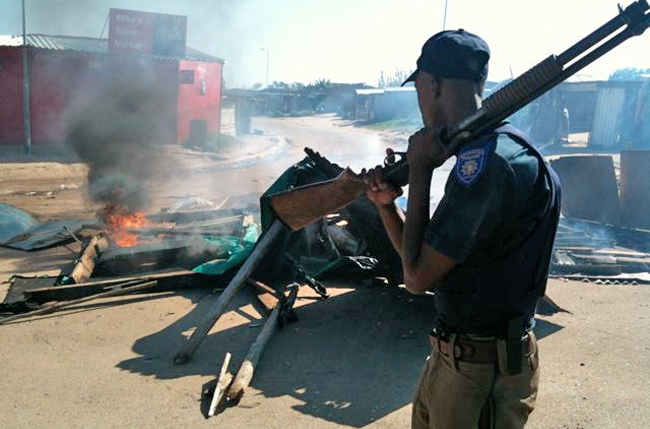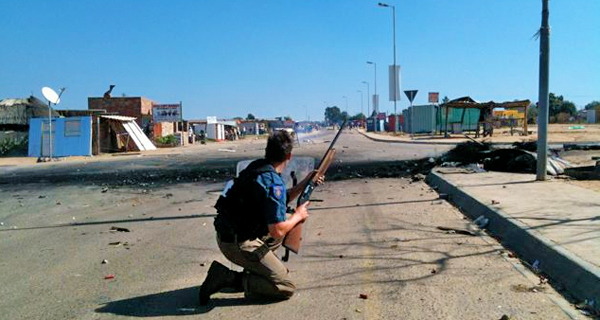Politics
The townships are burning – and foreigners may be next. Again.

On Monday the petrol bombs came out in Olievenhoutbosch, a settlement right in the heart of Gauteng. It was just wanton destruction, but the talk is of targeting foreigners, and soon. If security forces don't start taking that talk seriously, we face a repeat of 2008. Alex Eliseev was there.
When South Africa sobered up from the xenophobic mayhem of May 2008, we all thought we had learnt some lessons about humanity.
Dragging elderly Mozambicans from mining hostels and smashing their heads in with steel pipes, or torching them in front of a frenzied crowd, soaked our rainbow flag in blood and shamed us before the world. But as the struggle for resources intensifies, and anger grows over the most basic of service delivery, it appears a different lesson lingers.
Listen to the words of an Olievenhoutbosch resident, speaking about his fear that a housing riot that erupted there on Monday is headed for xenophobic fury:
“Later, they (the protesters) are going to start in the houses, they’re going to take them out…”
“Take who out?”
“They’re gonna chase the people from other countries out… like Zimbabweans, Nigerians, those who are living here… those who have shops here, they’re gonna break them down and take everything inside, because they belong to them… They say if maybe they start that fighting of xenophobia, killing the foreigners and stuff, the government will listen to them, to what they say.
“Zuma just said they should stop everything and wait until the World Cup is over and then he will help them. But they refuse to listen to the command.”
The equation is strikingly simple: we want what they have. We are willing to kill to get noticed. And we can use the World Cup as leverage.
Whether these threats – delivered on the second anniversary of the xenophobic attacks – are real or not is irrelevant. What they show is a terrifying glimpse into the minds of those who throw the rocks and shout down the tank-like Nyalas. Those who draw strength from being an invisible face in a crowd.

The riot in Olievenhoutbosch, near Midrand, was organised on Monday without the knowledge of many community leaders. It began in the dark hours of the morning and, before the sun was up, the protesters were at war with the police.
Taxi ranks were paralysed, workers returned home, children couldn’t go to school and instead took part in the fighting. By mid day, officers were destroying failed paraffin bombs or hiding them in their armoured vehicles. Kids hid behind homemade shields and fired their catties.
Police arrested 21 people. Paramedics rushed around treating the wounded. And the battles continued throughout the day.
Being there, one couldn’t help feel that the housing demands were giving way to some kind of primal thirst to destroy. Shops were set alight. A journalist’s car had a window smashed. Streets were blocked with rocks and hawker cages. There were no negotiations and the violence ended slowly, once a stalemate was reached.
Make no mistake, the issues are real and the demands are legitimate. It cannot be that this far down the road people are still living like this. Jacob Zuma said so himself while – on the same day as the protest – he visited the Sweetwaters township and met with its residents.

But the problem is that protests like these have become so frequent that those organising them have realised that it’s no longer enough to burn tyres and hurl rocks. They realise they have to up their game.
Last month, the government reported that more service delivery protests have taken place in the first three months of this year than in any equivalent period since 1994. Deputy minister of co-operative governance and traditional affairs, Yunus Carrim, warned that the riots are growing more violent.
We can throw many factors into this fiery cauldron – a third force, political motives fuelling the protests, anger at municipalities and untrained riot police. In the end, though, we have to face reality. People are angry, violent protests are increasing and there is dangerous talk of turning on foreigners. Again.
In 2008, police were caught off guard when attacks first broke out in the streets of Alexandra. Now, with the World Cup three weeks away, they cannot afford to make the same mistake.
And we cannot afford to ignore the voices in the streets.
By Alex Eliseev
(Eliseev is an EWN reporter. Your can follow him on Twitter as @alexeliseev)
Photos of Olievenhoutbosch raid: The Daily Maverick



 Become an Insider
Become an Insider